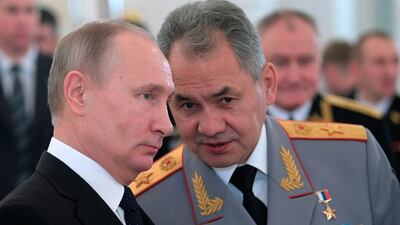The Russian military and political establishment seem to be suggesting relations with the US are at their lowest ebb. The Russians also want it be known that Moscow does not need Washington, in Syria or elsewhere, and that they are comfortable with their achievements, influence and strategy in Syria, even where Idlib is concerned. The Russian military establishment is pushing back against US military presence in Syria, which it describes as "illegitimate", accusing it of supporting and enabling terrorists in Syria and demanding its withdrawal before Iran-backed forces are made to pull out from Syria. The political establishment is also in a mood of escalation against the US but is keen to differentiate between president Donald Trump and his administration, which has pressured him into backtracking from his promises to withdraw US forces from Syria and from implicit agreements to let Vladimir Putin handle Syria and the fate of Bashar Al Assad.
The divergence between the military and the political establishments is not in the open but it is evident from the difference in the views of Russian experts close to the government, who attended the Valdai Club conference this week, which concluded with Mr Putin's speech. Private conversations with both attendees and sources on the fringes of the event indicated that Russia is coming under increasing pressure from Damascus to settle the battle for Idlib militarily and that the Russian defence ministry is on board because it wants victory in the war and is interested in anything that could achieve this goal. For its part, the political wing prefers giving Turkey more time and opportunities so that Russia is spared from having to lead such an offensive in Idlib, given the high humanitarian cost and implications for the relationship with Mr Trump and broader relations with the US.
On the surface, the Kremlin is feigning indifference regarding impending US sanctions on Iran. However, it knows that Russian-American co-operation will take a hit after the measures come into effect on November 4 and elections are held in Donbass in eastern Ukraine on November 11.
The erosion of popular support for Russian involvement in another quagmire could also push Mr Putin to give the nod to the Idlib offensive to settle the war soon, as desired by the military. Indeed, the Russian leader realises that military action remains for now a way to rally support and erase second-guessing of his actions. In truth, one of the issues that he is being second-guessed on has to do with Iran.
Mr Putin addressed this at the concluding session of the Valdai Club’s 15th annual meeting, using a logic echoing that of US former president George W Bush justifying his “war on terror” in Iraq. Mr Putin said that Iran was an important partner in the war against terrorists in Syria and that it was better to fight them there than to fight them “here”.
He added that removing Iran from Syria was not a Russian issue, in response to questions about a request to do so from the Trump administration. He said that the withdrawal of all foreign forces from Syria must take place in the framework of a dialogue between Iran and the US and offered to help facilitate it. The Russian leader stressed that those who want Iran to leave must give guarantees not to intervene in Syrian affairs and stop financing terrorists and pledged not to abandon his allies in Damascus – both the regime and Iran – saying what was needed was to enhance Syrian defensive capabilities, before the forces invited to assist by the regime had left.
Here a military source, expressing anger with the volte face in the Trump administration’s erstwhile position of what Moscow believed was a green light for it to handle the Iranian issue in Syria, said what will happen now depends on the outcome of the upcoming visit by US National Security Adviser John Bolton to Moscow.
The Russians believe Mr Bolton is "obsessed with Iran" and that Syria is unimportant to him, except in regards to Iran and Israel. Some Russian experts think US forces will indeed withdraw from Syria exactly as Mr Trump had pledged. Others think the key to any deal with Mr Bolton would be maintaining good relations with Israel, despite Israeli airstrikes on Iranian positions in Syria, and others still believe there is no alternative for Moscow other than to make its position clear regarding the Iranian dilemma. Otherwise, tensions in relations with the US will be inevitable, despite the solid commitment to avoid military confrontation. There is also a view that US demands for Iran to withdraw is empty rhetoric, because Washington wants Iranian and Iranian-backed forces and advisers to remain in Syria, as this means they would act as open targets for military strikes and therefore present an effective means to put pressure on Tehran.
I also had the chance to raise questions to Mr Putin about Egypt. This week saw a summit between Mr Putin and Abdel Fatteh El Sisi in Sochi. Mr Putin said that Egypt has an important role in the context of the Cairo-based Syrian opposition factions and co-operation with Russia. Egypt will also be crucial to any bid to rehabilitate the Syrian government at the level of the Arab League, especially with regard to securing the approval of the Gulf states and the return of the Gulf role in Syria, an issue that had taken some steps forward on the sidelines of the UN General Assembly last month. Russian-Egyptian military co-operation is also significant in and of itself, with ongoing joint exercises and defensive collaboration, in addition to $25 billion worth of economic co-operation.


